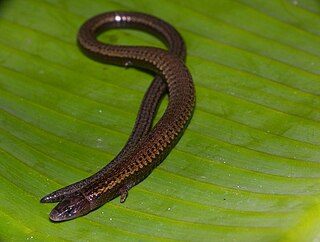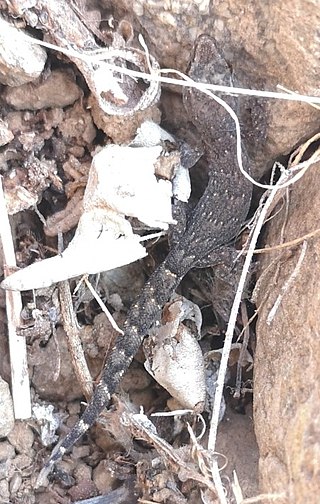
Gonatodes is a genus of New World dwarf geckos of the family Sphaerodactylidae.

Hemidactylus is a genus of the common gecko family, Gekkonidae. It has 192 described species, newfound ones being described every few years. These geckos are found in all the tropical regions of the world, extending into the subtropical parts of Africa and Europe. They excel in colonizing oceanic islands by rafting on flotsam, and are for example found across most of Polynesia. In some archipelagoes, cryptic species complexes are found. Geckos like to live in and out of houses. They have been introduced to Australia.

Tarentola is a genus of geckos, commonly known as wall geckos.

Blaesodactylus is a genus of six species of lizards, endemic to Madagascar, commonly known as velvet geckos, and formerly considered part of the genus Homopholis.

Homonota is a genus of South American geckos, commonly known as marked geckos.

Oedura is a genus of medium to large geckos, lizards in the family Diplodactylidae. The genus is endemic to Australia. Species in the genus are referred to by the common name velvet geckos.

Microlophus is a genus of tropidurid lizards native to South America. Around 20 species are recognized and 10 of these are endemic to the Galápagos Islands, where they are commonly known as lava lizards. The remaining, which often are called Pacific iguanas, are found in the Andes and along the Pacific coasts of Chile, Peru, and Ecuador.

Dibamus is a genus of legless lizards in the family Dibamidae.

Bachia is a genus of lizards that belong to the spectacled lizards family.
Ecpleopus is a genus of lizard in the family Gymnophthalmidae. The genus contains only one species, Ecpleopus gaudichaudii, which is endemic to Brazil.

Charles Gaudichaud-Beaupré was a French botanist.

Crossodactylus is a genus of frogs in the family Hylodidae. The genus occurs in Brazil, southern Paraguay, and northern Argentina. These frogs are sometimes known as Limnocharis, Tarsopterus, Calamobates, and by the common name spinythumb frogs. They typically inhabit streams in mountainous areas in the Atlantic Forest or in montane savanna.

Stenocercus is a genus of South American lizards, commonly called whorltail iguanas, of the family Tropiduridae. This genus has 80 valid described species.

Amphisbaena is a genus in the family Amphisbaenidae, commonly known as worm lizards. Over 100 species are placed in this diverse genus.

Amalosia lesueurii, commonly known as Lesueur's gecko or Lesueur's velvet gecko, is a species of gecko, a lizard in the family Diplodactylidae. The species is endemic to Australia.

The Chilean marked gecko is a species of lizard in the family Phyllodactylidae. The species is endemic to Chile, in the Chilean matorral ecoregion. There are three recognized subspecies.
Stegonotus is a genus of snakes in the family Colubridae. Species of the genus Stegonotus are native to Australia, Indonesia, and New Guinea.

Amalosia is a genus of lizards in the family Diplodactylidae. The genus is endemic to Australia. It includes four species:
The Coquimbo marked gecko is a species of lizard in the family Phyllodactylidae. The species is endemic to Chile. Is the smallest reptile of this country.















